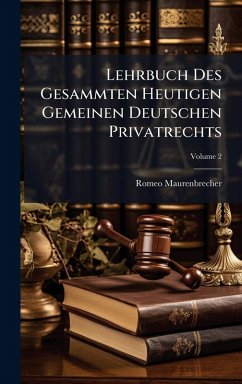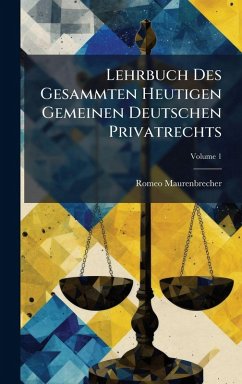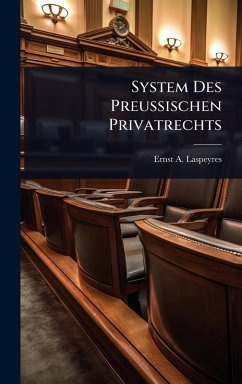
Pandekten Des Römischen Privatrechts Aus Dem Standpuncte Unseres Heutigen Rechtssystems
Versandkostenfrei!
Versandfertig in über 4 Wochen
39,99 €
inkl. MwSt.
Weitere Ausgaben:

PAYBACK Punkte
20 °P sammeln!
This is a scholarly work titled "Pandekten Des Römischen Privatrechts Aus Dem Standpuncte Unseres Heutigen Rechtssystems", also known as "Institutionen D. Gemeinen Deutschen Civilrechts." Authored by Eduard Böcking, this volume serves as an introduction to the study of Roman law and the Pandects of common civil law. The book explores Roman private law from the perspective of contemporary legal systems, providing insights into the historical context and enduring relevance of Roman legal principles. It delves into the institutions of common German civil law, offering a comprehensive analysis s...
This is a scholarly work titled "Pandekten Des Römischen Privatrechts Aus Dem Standpuncte Unseres Heutigen Rechtssystems", also known as "Institutionen D. Gemeinen Deutschen Civilrechts." Authored by Eduard Böcking, this volume serves as an introduction to the study of Roman law and the Pandects of common civil law. The book explores Roman private law from the perspective of contemporary legal systems, providing insights into the historical context and enduring relevance of Roman legal principles. It delves into the institutions of common German civil law, offering a comprehensive analysis suitable for legal scholars and students alike. This work is valuable for those seeking a deeper understanding of the foundations of modern legal thought and the evolution of legal systems. This work has been selected by scholars as being culturally important, and is part of the knowledge base of civilization as we know it. This work was reproduced from the original artifact, and remains as true to the original work as possible. Therefore, you will see the original copyright references, library stamps (as most of these works have been housed in our most important libraries around the world), and other notations in the work. This work is in the public domain in the United States of America, and possibly other nations. Within the United States, you may freely copy and distribute this work, as no entity (individual or corporate) has a copyright on the body of the work. As a reproduction of a historical artifact, this work may contain missing or blurred pages, poor pictures, errant marks, etc. Scholars believe, and we concur, that this work is important enough to be preserved, reproduced, and made generally available to the public. We appreciate your support of the preservation process, and thank you for being an important part of keeping this knowledge alive and relevant.












